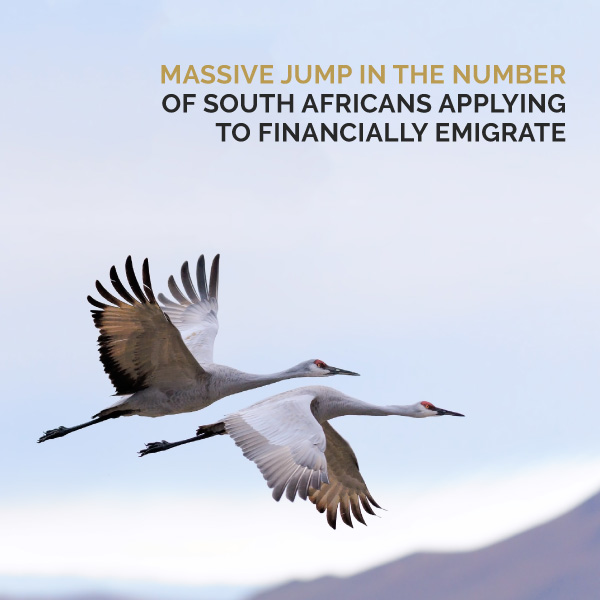MASSIVE JUMP IN THE NUMBER OF SOUTH AFRICANS APPLYING TO FINANCIALLY EMIGRATE
The number of people enquiring and actually going through with the process of financial emigration has “skyrocketed”, says Jonty Leon, legal manager at Financial Emigration.
The main reason for this is the amendment to section 10 of the Income Tax Act – otherwise known as the expat exemption – which will come into effect from 1 March 2020, he said.
“South Africans who meet the requirements to financially emigrate are deciding to formally cut ties with the country from a tax and exchange control perspective to ensure that they protect their foreign earned income and assets.”
What is financial emigration?
Financial Emigration is the formal process to note oneself as a non-resident for tax and exchange control purposes in South Africa, said Leon.
“The process ensures that one has met all requirements under the Income Tax Act to ensure that one is a non-resident in accordance with South Africa’s tax residency tests and also ensures compliance with all exchange control regulations for non-residency,” he said.
Leon said that financial emigration is often confused with formal emigration, however, these are not the same as people undergoing formal emigration do not necessarily meet the requirements to be seen as a non-resident for tax purposes.
“It is essential that our tax residency tests are taken into consideration and applied to each individual to ensure that they are actually non-residents for tax (formal emigration does not have this extremely important compliance step),” he said.
Not open to everyone
Leon explained that the process is not open to everyone. and one must meet the requirements of a tax residency test to use the financial emigration process correctly.
For instance, rotational workers, having their home base in South Africa and working in another jurisdiction part of the year will not be candidates for financial emigration, he said.
This is because they are clearly still tax residents of South Africa in terms of our tax residency tests.
“Limitations also come in the form of having limited access to your bank account in South Africa from an internet banking perspective,” he said.
“Only viewing rights are given to those who have financially emigrated and thus a relationship manager is assigned to the account and to the account holder in order to make use of the account.
“A relationship manager is very similar to a personal banker, and is put in place due to the limitations of internet banking.”
Common misconceptions
Leon highlighted some of the most common misconceptions about financial emigration below:
- “You must close your South African bank account” – Although the functionalities of one’s bank account will change, as its status changes to an Emigrant Capital account, one can keep a South African bank account. All current South African debit orders can remain the same.
- “You must liquidate all your South African assets” – One’s asset portfolio can remain the same even once the SARB process is complete. One can still hold, and further contribute to assets in South Africa and may even gain more assets in South Africa should one wish to. It is always best to communicate with policy and other providers to ensure that they are aware you reside abroad as this may amend certain conditions for one’s contracts.
- “You must give up your passport” – Once you have completed the Financial Emigration process you still remain a South African citizen and can retain your South African passport. You can therefore still return to South Africa for visits and holidays without requiring a visa. One is considered a non-resident in terms of SARS and SARB with Financial Emigration, and relinquishing one’s citizenship is a different formal process through Home Affairs.
- “You do not need to file tax returns in South Africa anymore” – Once Financial Emigration is concluded, this does not mean that you are exempted from submitting yearly tax returns with SARS. Even if nil returns, one will not be automatically de-registered from SARS. After financial emigration, only South African sourced income will need to be declared – once you dispose of all your assets such as bank accounts, properties, trusts, shares and policies, then you can deregister for tax in its entirety, through a formal process with SARS, and then one will not need to submit any tax returns.
Source: BusinessTech
![2025-logo-[Recovered] Tax Consulting South Africa](https://www.taxconsulting.co.za/wp-content/uploads/2025/01/2025-logo-Recovered.png)


